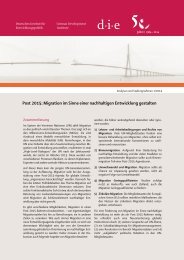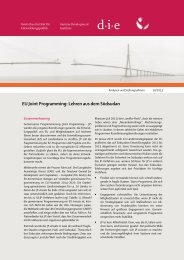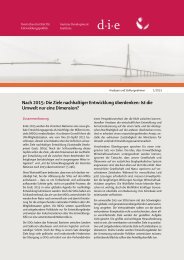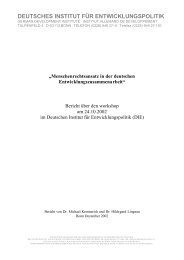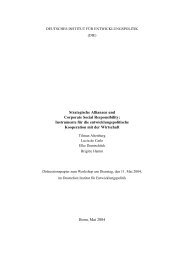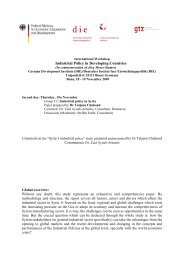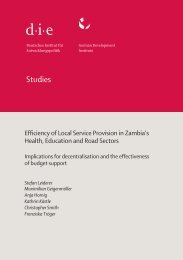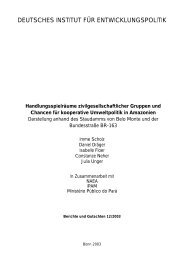Middle East / North Africa and the Millennium Development Goals ...
Middle East / North Africa and the Millennium Development Goals ...
Middle East / North Africa and the Millennium Development Goals ...
Create successful ePaper yourself
Turn your PDF publications into a flip-book with our unique Google optimized e-Paper software.
<strong>Middle</strong> <strong>East</strong> / <strong>North</strong> <strong>Africa</strong> <strong>and</strong> <strong>the</strong> <strong>Millennium</strong> <strong>Development</strong> <strong>Goals</strong><br />
Box 1 continued: Discrimination against women in <strong>the</strong> civil-status<br />
codes of Arab countries<br />
on a wife’s duty to obey her husb<strong>and</strong>. Both men <strong>and</strong> women are entitled to sue<br />
to enforce <strong>the</strong>ir mutual claims. If a court recognizes a husb<strong>and</strong>’s claim that his<br />
wife has been negligent in her duty to obey, <strong>the</strong> husb<strong>and</strong> may refuse his financial<br />
support for her.<br />
However, <strong>the</strong> wife’s right to support has drawbacks for her as well, because it is<br />
often interpreted in <strong>the</strong> way that <strong>the</strong>re is no need for women to seek gainful employment.<br />
Indeed, in some countries <strong>the</strong> fact that a wife seeks employment is<br />
sometimes interpreted as a disobedience toward her husb<strong>and</strong> – as long as <strong>the</strong><br />
husb<strong>and</strong> has not given his explicit approval. This, however, is often difficult for<br />
husb<strong>and</strong>s for social reasons – a husb<strong>and</strong>’s approval of his wife’s wish to work<br />
may be interpreted as meaning that <strong>the</strong> husb<strong>and</strong> is unable to provide adequate<br />
support for his wife.<br />
Except for employment or continuation of training, husb<strong>and</strong>s are permitted to<br />
forbid <strong>the</strong>ir wives from traveling unaccompanied abroad or even within <strong>the</strong><br />
country. While women can use marriage contracts to protect <strong>the</strong>mselves against<br />
such measures, <strong>the</strong> only option <strong>the</strong>y have if <strong>the</strong>ir husb<strong>and</strong>s break <strong>the</strong> agreement<br />
is, again, recourse to a divorce court, which may <strong>the</strong>n dissolve <strong>the</strong> marriage –<br />
with all <strong>the</strong> social <strong>and</strong> economic consequences that this may entail for <strong>the</strong> wife.<br />
Right to divorce<br />
A husb<strong>and</strong> has <strong>the</strong> right to terminate his marriage at any time, even without <strong>the</strong><br />
consent of his wife <strong>and</strong> without a need to cite his grounds. He just has to declare,<br />
in <strong>the</strong> presence of his wife, that he repudiates her (ţalaq). In this case, <strong>the</strong><br />
husb<strong>and</strong> remains unconditionally obliged to support his former wife.<br />
More recent Islamic law has made it possible to apply for a no-contest divorce;<br />
this takes on <strong>the</strong> form of a repudiation of <strong>the</strong> wife by <strong>the</strong> husb<strong>and</strong> after <strong>the</strong> wife<br />
has agreed to pay a certain amount of compensation to <strong>the</strong> husb<strong>and</strong> (hul’). What<br />
this means is that <strong>the</strong> wife is required to pay <strong>the</strong> husb<strong>and</strong> a certain sum, which<br />
should as a rule not exceed <strong>the</strong> value of <strong>the</strong> wife’s claim to support from her<br />
husb<strong>and</strong>; in o<strong>the</strong>r words, in this case <strong>the</strong> wife would, in <strong>the</strong> extreme case, fully<br />
relinquish her claim to support.<br />
Without her husb<strong>and</strong>’s consent, <strong>the</strong> only option a married woman has is to petition<br />
a court to terminate her marriage, i.e. she has <strong>the</strong> right to sue for divorce<br />
(taţlīq or tafrīq). However, a divorce court is permitted to grant a divorce petition<br />
only in certain cases, for instance if a husb<strong>and</strong> (i) fails to meet his duty to<br />
support his wife; (ii) has deceived or willfully deserted his wife; (iii) is serving<br />
a prison sentence; (iv) has violated a marriage contract (assuming one has been<br />
German <strong>Development</strong> Institute 65



